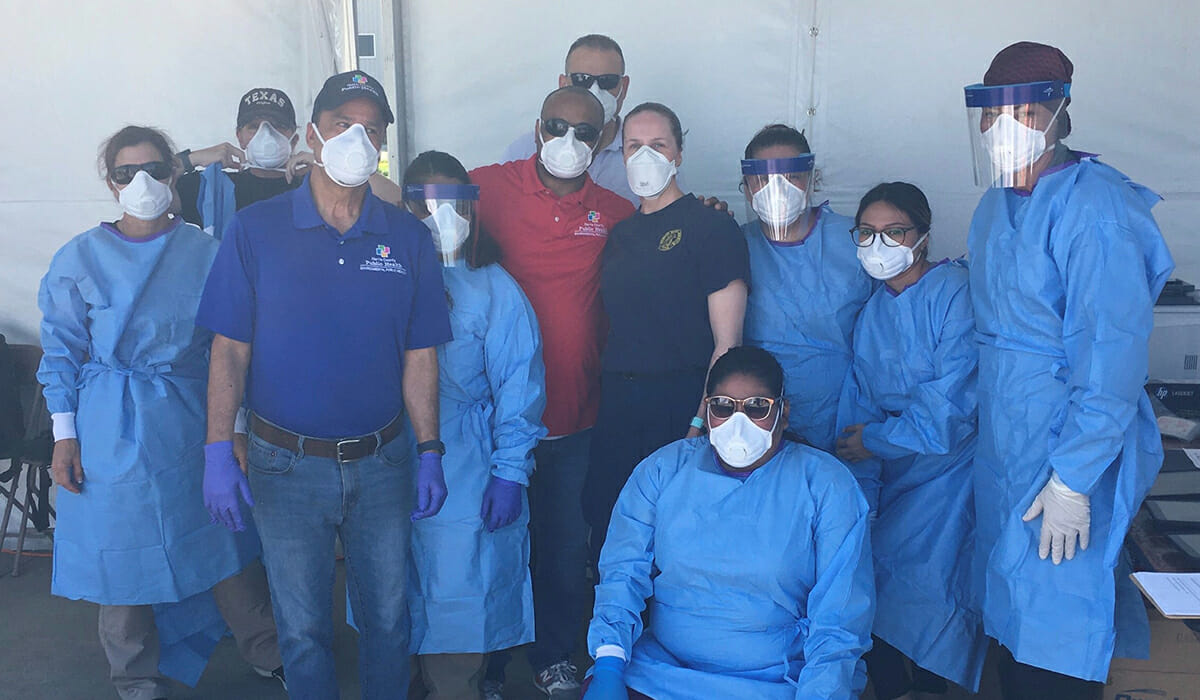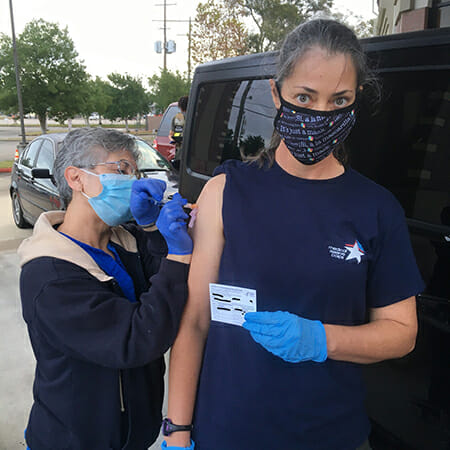Microbiologist Spends Pandemic Supporting Texas Community’s COVID-19 Response

Meet Daily Point of Light Award honoree Mary Miller. Read her story and nominate an outstanding volunteer or family as a Point of Light.
When the COVID-19 pandemic hit the United States last March, Mary Miller knew she wanted to help out in some way. The microbiologist had recently retired from the military, where she worked on outbreak and pandemic response in Asia and East Africa. After searching for volunteer opportunities online, she was drawn to the Harris County Medical Reserve Corps, a national network of volunteers, many of whom are medical and public health professionals, who help their communities respond to emergencies such as natural disasters or disease outbreaks.
Throughout the past year, Mary volunteered to help with COVID-19 testing, antibody testing and vaccine distribution in Harris County, Texas. She frequently worked full-time, pulling 12 hour days sometimes seven days a week. While the need for COVID-19 response volunteers in her area has dwindled as more people have been vaccinated, Mary looks forward to being able to assist Harris County Medical Reserve Corps with their natural disaster response in the future.
Describe what Harris County Medical Reserve Corps does and how you became involved with them.
Medical Reserve Corps falls under Health and Human Services, so it’s under a government agency. In times of pandemic response, disaster relief or anything like that, Medical Reserve Corps augments the local community. Harris County Public Health had a need and Medical Reserve Corps recruited volunteers to fill that need. I actually was looking for opportunities to support COVID response, and I stumbled across Medical Reserve Corps through Volunteer Houston, which is an organization whose website advertises all sorts of ways you can help as a volunteer. I had recently retired from the military and I was looking for an opportunity to help because I have such a long history of public health in the military. I was really, really grateful that Medical Reserve Corps gave me that opportunity to help.

What did you do in your volunteer role?
March 23 was my first day in 2020. I took a month off in May 2020 because I got really burnt out fast, because we were doing 12 hours a day, seven days a week, and you’re outside the whole time in full PPE, so it’s a lot. I took a month to gauge how long I can do this, and I had to learn how to pace myself. I came back in early June and went back into the testing role from June 2020 all the way through the end of October 2020. I was doing full-time then. Still working for Harris County Medical Reserve Corps, there was an opportunity to do COVID antibody testing. Basically, we were given random addresses to ask people if they would volunteer a blood sample to be tested to see if they had been exposed to COVID or not. We go there with a Harris County Public Health employee, a volunteer like myself who would do the screening questions and get the consent forms all filled out, and then have a phlebotomist there to draw blood at their house, standing outside. Once that was complete in November, the vaccinations started, and I assisted with the vaccinations from December through late March.
When you were looking for volunteer work, what about Harris County Medical Reserve Corps stood out to you?
It was so perfect for what I had been doing. When I was in the military, I did outbreak response and pandemic response. We worked with the CDC and Global Health. I had been working in Asia and East Africa and other places, basically teaching other people like myself better ways to prevent disease spread, how to identify a potential outbreak and how to isolate people who were potentially sick with the disease who could be highly contagious and infectious. We were teaching them how to wear their PPE, how to wash their hands properly and teaching outbreak response. When a big pandemic happens, as a microbiologist who used to train on that, it seemed a bit wrong not to get involved. … When I found out about Medical Reserve Corps, I thought, this is perfect. Not only is it good for pandemic response, it’s also great for disaster response so in the future, knock on wood, if there’s a hurricane or flooding or anything like that, I’m already tied into the system so I can also be contacted for that.
Why is it important for your community to have this resource?
I think Medical Reserve Corps is great for the Harris County community in supporting public health and augmenting it, because there was nothing to compare to what we did there. We all talked about it as far as pandemic response planners, but when it really happens and the manpower that is needed, and the amount of coordination and sustained effort is needed, it’s a lot. … Throughout the whole evolution of the process — shifting from trying to detect it to trying to vaccinate against it — there was a lot of public fear and public anxiety. [The community] didn’t know what to trust and who to trust, so I really appreciate being able to be a part of that.
Also, having that privilege of being able to interact with people who have lost someone or have dealt with COVID at a very personal level. I remember one day, we were screening people for vaccinations. This woman came through, she’s probably in her 50s and she had two adult children in the car. When you see hundreds of people, sometimes up to 1,000 people a day, and you’re interacting with all of them, you really start to be aware of when someone’s mood is not right. We could see this woman and these two adult children were sad — just absolutely, completely deflated. We have to educate them and tell them about the vaccine, and the nurses helped teach me how to be a little more perceptive and reach out to these people. This woman confessed to us that very morning, she had held her husband as he died from COVID. She was in full PPE and she couldn’t even touch her own husband because he was sick with the disease. From what I understand, she had already gotten her first dose of vaccine, so I assume he already possibly had been vaccinated, and all he needed was one more dose and it could have protected him. To see the pain in her eyes and see the pain in her children’s eyes, to know they lost their dad, and it was that close. If they had maybe been a month earlier with the vaccine, maybe they still would have their dad. It’s stuff like that and seeing so many people going through and being so grateful to be a part of this community effort, where if they get vaccinated, they can help protect other people.
What have you learned through your experiences as a volunteer?
When we would do the antibody testing and listen to people who had a really bad case of COVID and somehow fought through it or had lost a loved one, it reminds you that we should always be thankful for what we have and not take it for granted. Another thing I learned a lot from watching the nurses and the other people I worked with is just the level of patient care. … Some of the patients we had to vaccinate, it was a little difficult because we were dealing with patients who had special needs, dementia, autism. Some of these patients were not fully aware of what was going on. Despite having 1,000 cars lined up and the need to get through these people quickly, whenever I watched the nurses handle the patients with the utmost compassion, like that patient was the only patient they had to deal with that day even though there were thousands of others behind them —the compassion that each one of those nurses gave those patients in that moment, to me, was overwhelming. To treat each patient as a human being and look them in the eye and give them that attention for that few minutes they had with them, that is one of the biggest things I take away from it — the humanity and the compassion I saw when there was so much darkness in the media and other places. There was so much compassion and humanity in that moment of volunteering.
What do you want people to learn from your story?
Through the volunteering and through the people I interact with and through the community, it gave me so much hope, because it sort of renewed my faith in humanity and all the good people who are out there. A lot of times you get tied up with all the bad stuff that is out there and people get very fearful, especially when you’re isolated and you’re sitting at home either with your immediate family or you’re by yourself. Everything seems so grim and dark and bad and nothing good is going to come of this, but I would go out there everyday. Sometimes I admit, it was very hot and very uncomfortable. Sometimes people were waiting out there for three or four hours in the heat to get tested, or sitting out in the cold to get vaccinated. You see the number of people who would come through and be so grateful and so happy we were doing this for them, and I said, we couldn’t do this if you weren’t here. The point is the community has to want to get vaccinated and get tested. To see the very bare roots of humanity of people wanting to come together and protect each other and do the right thing — it was kind of overwhelming sometimes. In all this negativity, people were so happy and so grateful and that’s what kept us going, the positive energy we were getting from them. …Through volunteering, it introduces you to opportunities and people you wouldn’t normally get to interact with. It shows the good side of humanity you don’t always see sometimes.
Is there anything else you would want to share with readers?
I encourage people to volunteer and step outside their comfort zone and try something they haven’t tried before. It leads to something better that you wouldn’t expect. You’re doing something that in all other aspects seems wrong, to be going around people who are sick with a disease that nobody fully understands and all that. It was challenging, but it challenged me in a good way. The people I met along the way, whether they were the people we were serving or the people I was working alongside, it changes you in a very positive way.
Do you want to make a difference in your community like Mary? Find local volunteer opportunities.
